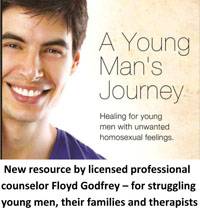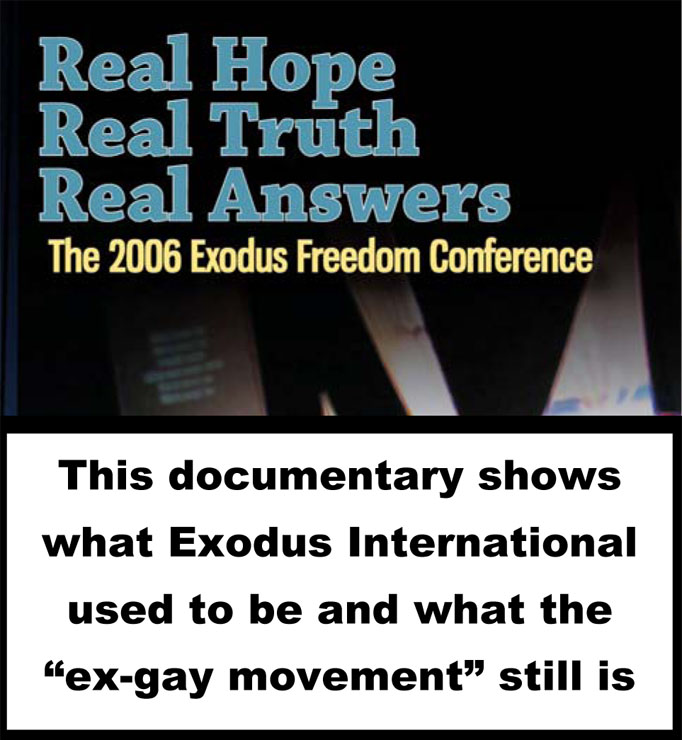Dr. Miriam Grossman feared telling a client about reparative therapy
February 13, 2013
Text from Dr. Miriam Grossman’s blog article “Gay or Straight? When others decide for you – Part One” on www.miriamgrossmanmd.com: … “I once saw a college student who, a few hours earlier, nearly jumped from the window of his ninth floor dorm room. Fortunately he hesitated, and walked to the campus counseling center instead. He was screened by a therapist, then sent over to me for an emergency psychiatric evaluation.”
“Malik (not his real name) was deeply distressed. ‘I don’t want to be how I am’, he explained. ‘I’m attracted to men, but it isn’t me. I know it’s not me.’ It was a dreadful situation. Malik was from Malaysia, where homosexuality is punishable by caning and decades in prison. He had struggled for years, never acting on his urges or sharing his secret. Now he felt hopeless and
suicidal.”
“The therapist had reassured him that help was available. With therapy, she’d explained, Malik would eventually accept who he is, and understand why he’d come to hate himself: because society did. There was also group therapy. He could meet students like himself and, with their support, perhaps be able to eventually ‘come out’ to his friends and family.”
“But her advice compounded his distress. ‘It’s not who I am!’ he insisted to me. ‘I’ll never accept it! Why would G-d do this to me?’ I listened carefully. The help Malik wanted existed, but I was afraid to tell him about it. Where I worked, reparative therapy was taboo; its existence was never acknowledged. On a politically charged hot potato scale of 1 to 10, this issue was a 12.”
“The mental health establishment says sexual orientation doesn’t change in the direction of heterosexuality. Reparative therapy can be dangerous, it warns; a resolution condemning it had nearly passed. What about ex-gays -the men and women who claim to have succeeded? They are deceiving themselves.”
“At the same time, a small, respectable group of professionals contend that change is possible, and a vocal community of ex-gays says their lives give testimony to that. I’d read compelling interviews, and seen a picture of them picketing the national meetings of psychiatrists and psychologists, carrying signs that say ‘I DO exist’. That’s what flashed through my mind as Malik sat in silence, head down.”
“ ‘Malik’, I said, ‘I can prescribe medication so you’ll feel less anxious and depressed. You also need therapy. The therapy we provide here may help you accept this part of yourself, and help you figure out how to deal with friends and family.’ ‘No,’ he interrupted. ‘I could never, ever tell my family. You don’t understand! This is not who I am!’”
“Then I did the unthinkable. ‘There is another kind of therapy,’ I continued, ‘that would support you in struggling against your attraction to men.’ I decided to tell him, because it was the right thing to do. ‘What?’ he asked. ‘Does it work? Can I do it here?’”
“I shared what I knew, and told him about a website with more information. Only gay-affirming therapy was available here, I explained. He needed to give this a lot of thought, and decide what he wanted. Malik claimed to no longer be suicidal. We reviewed the medication, and set up the next appointment. He thanked me and left.”
“The door closed, and though I knew I’d done the right thing for my patient, I wondered if I’d put my good standing in jeopardy. Word would spread: Miriam told a student about reparative therapy! I could just as well have announced my membership in the KKK. What consequences would I face?”
“Was there even one other person on our large staff, I wondered, who shared my views – that Malik should be told about both options, and allowed to choose his own path? If so, they’d never publicized their opinion. But considering how worried I was about my own deviation from the party line, I could understand their silence. To be continued…”




